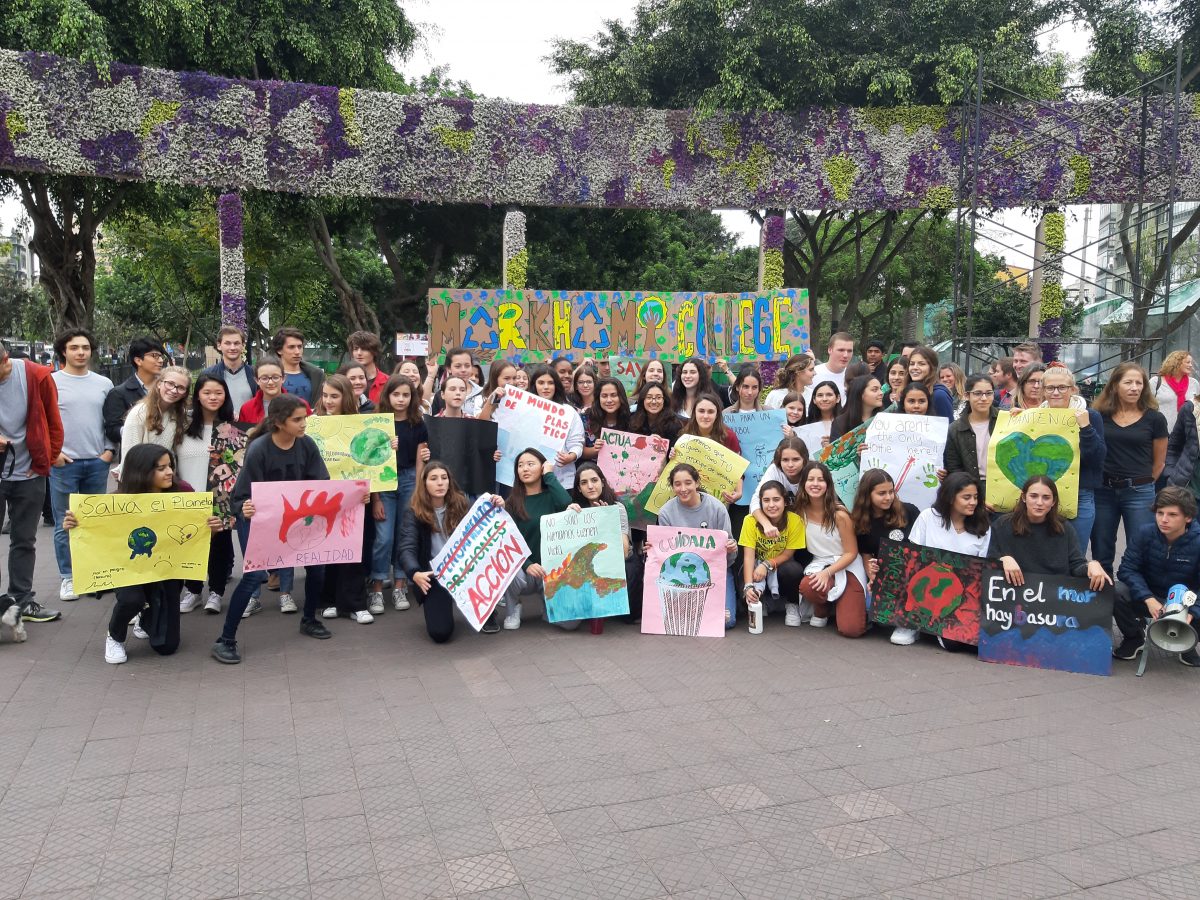Health and Environmental Council at Markham College
Posted: 23 March 2020

IDEALS
- Environmentalism
- Leadership
- Service
Discoveries
- Problem solving
- Sense of responsibility
- Commitment to sustainability
- Teamwork
- Tenacity
Age range
Whole school
Overview
As a leading educational institution Markham College is committed to promote environmentally sustainable practices across the school. It is our duty to prepare students with the knowledge and skills to care for our planet’s resources and to make a positive contribution to our community. We therefore aim to develop policies that will help promote healthy habits among pupils and staff.
The Health and Environment council is one of eight councils in the school, and is in charge of promoting sustainable practices around the school and among faculty and students. The council is made up of 10-12 students aged 14-17 with one representative from each of the younger year groups (S2 and S1). We meet once a week to plan for activities, campaigns or fund raising activities if we need to gather funds.
Planning
Five years ago the Health and Environment council worked to identify major environmental issues around the school that needed to be addressed. With help from management they started installing water fountains able to refill bottles in seconds helping to reduce the amount of single-use-plastic within the school. Installing enough water fountains took time, we looked into data of how many fountains we needed per student on campus. We also gathered data on how many bottles were purchased at the cafeteria every week and extrapolated that to create a greater impact over the reasons for doing it.
The council also designed a bin, recycling and composting system to help greatly reduce the amount of waste produced.
From there the council sort approval to design and implement a whole school Environmental Policy which was drafted in 2018, and then put into affect for the first time in 2019. The team of students used their research to influence the policy and its contents.
Activity
Single-use Plastics
The school has a policy of NO SINGLE-USE PLASTIC BOTTLES on campus.
- No single-use plastic bottles, cups, dishes or cutlery are to be sold or provided by the school or during any school event. We encourage the use of reusable water bottles and reusable cups.
- We recommend the use of reusable bags for staff and sixth-form students, these will be provided at the main entrance of the US campus and may be purchased at the Merchandising Shop
Waste Management
Separate Rubbish bins for Organic, Paper, Plastic and General Waste must be accessible in each section of the school and each classroom.
- Organic Waste (Brown bins)– Each campus will have a compost area where ALL relevant organic wastes are disposed of and, once decomposed, used in our own gardens.
- Plastic waste (White bins) –Should be collected in classroom and outside bins and disposed of accordingly
- Paper Waste (Blue bins)– All flat paper with only one side used/printed (not confidential documents) to be collected at the ITC and made available for reuse. All other paper to be collected in the paper waste bins.
- General Waste (Black bins)– All non-recyclables materials should go into general waste
- Batteries and electronics– Should be disposed of in a collection bin in front of the DT Department, the Science building storage and the ITC in each section.
Transport and School trips
The school continues to recommend ‘Movilidades’ and carpooling for students and families who are able to. We also recommend bike riding and walking to school where possible.
- The school’s trip proposal process includes a section on environmental impact considerations.
- The school recommends incorporation of environmental projects as part of the activities programme for trips.
- School Trip protocols include the use of reusable camping plates/cups/cutlery and water bottles for all trips.
- Other forms of carbon emissions offset are also recommended such as support of local environmental projects or payment to a carbon offset organization for flights.
Paper use policy
The school recommends limiting the printing of documents where possible, using e-readers, laptops and printing documents (as a default) on both sides if needed.
- Internal assessment exams should be printed in this manner, unless exams have any special specifications.
- One school printer in the ITC is available for draft printing and prints one-sided on already-used paper.
- The reports will only include one page and the rest can be accessed electronically.
- The Markhamian (yearbook) will be printed only as requested by the parents or students.
Water use policy
Water is a very important and scarce resource, as a school we should make pupils aware of how to safe and make responsible use of this resource.
- Water use for garden and fields should be carefully monitored, as is the water renewal system in the swimming pool.
- Water bottle filling stations should be installed and available in all sections of the school.
- Water saving faucets should be installed in every bathroom around the three campuses.
Electricity use policy
Electricity use within the school should be carefully monitored.
- Maintenance staff and teaching staff have a clear policy on switching lights off when leaving a room.
- All classroom should have “turn the lights off” signs. All classrooms with Air Conditioning systems should have a sign stating the maximum and minimum temperatures allowed.
- The D&T, Science and IMPACT departments should look into integrating alternative energy projects into their curricula, to further environmental consciousness.
Food consumption
As a school, we encourage fresh, unprocessed (or minimally processed) food for lunches, bake sales, the US cafeteria, CAS Shop and any other purveyor.
- The cafeteria will always provide one vegetarian option each day, we support and promote to lessen the consumption of animal meat and animal products.
- We ban the selling of any processed meat on campus, by any food purveyor or Bake Sale.
- Food and lunches delivered to students at all campuses must fit within the school’s policy.
Meetings and School events
This policy also extends to all meetings and school events, not only during school hours.
- All meetings should provide coffee/tea and cups with saucers, hot water, a water jugs or ‘bidones’ and glasses, school tableware (see below) or reusable plastic cups or glasses.
- Outside providers contracted for food or refreshments, must include in their contract the use of plates, cups and cutlery, which follow the school’s policy.
- School ‘Tableware’– All sections should have ‘Bidones’ for events and meetings – fillable at filling stations or water filters at the staffroom. Also, have plastic plates, cups, bowls and cutlery – all available at F&N class and kitchenette.
- Refund system –A system of refund for return of school tableware will be employed at public events, adding the cost of the tableware to the sold products, and reimbursing for its return.
- Alternatively, any sale or school event could use non-plastic biodegradable tableware or ensure 100% recycling of any plastic waste. (Contact for NGO’s are attached inthe Implementation Document)
Awareness, promotion and monitoring
It is the responsibility of every member of staff to create awareness about the importance of key environmental issues, like saving water, energy, eliminating plastic use, reducing animal products in our diets and recycling.
- In the classroom, teachers should make sure students use the bins appropriately.
- Outside the classroom, teachers and prefects should do the same during duties or any kind of event.
- Tutors should make sure students are not bringing plastic bottles from home and encouraging the use of refillable bottles.
- Staff and 6B students who purchase plastic bottles outside the school should not bring them in school.
- Awareness campaigns should be held at the start of every school year, and there should be one staff member per section responsible for promoting and enforcing these policies.
Challenges
Most challenges came from the school logistics team, many of the changes the students wanted to achieve required some changes in infrastructure for example buying and installing new water fountains or segregated bins.
So the first year we focused on gathering information and raising awareness. Students presented the problems that they identified to Upper Schools Management and little-by-little changes happened. We also insisted that policies needed to change in order to make meaningful, long-lasting changes.
Impact
Banning of plastic bottles was the most drastic change we implemented. Having backed the decision with data and announcing it the year before we managed not to get any backlash from parents or students. Students now are much more conscious about their plastic use, not only bottles. All teachers carry reusable bottles, leading by example was our main focus as a faculty.
The members of the council felt really empowered by the whole process; they showed remarkable leadership skills, learnt how to deal with both adults and peers who are resistant to change. They learnt to speak up for what they believe is right and that by changing policies from within we can create a more lasting change that can create a snowball effect.
Long term
Since then we have been able to get more people on board with our efforts and our overall aim is to create a whole school environmental consciousness that transcends the school’s walls and influences both their families and our society. It took a while but we wanted to empower the students instead of just imposing a policy that came from senior management. The result was more impactful and taken better by students, parents and staff.
The environmental policy has been adopted by all the sections and it will be revised and updated every year.
We continue to run eco-friendly initiatives within the school. Last year the H&E Council teamed up with students from the Lower School and Early Years to make ‘EcoBricks’; plastic bottle packed with used plastic to set density to create a reusable building block. This activity helped to create awareness in our younger students around single-use plastics. We will use the EcoBricks to build something in the school that shows the amount of plastic used (actual weight) and what that represents in terms of contamination of water, air and soil.
We have also stopped printing the yearbook and reports in hard copy to reduce paper use, as well as composting all organic materials from the Food & Nutrition classroom.
Advice
- Collect data! I think the fact that students gathered a lot of data in the planning stages was really impactful and help the school to draft a plan towards the objective, the students had to comply with a specific time-frame, which took time, but eventually we had proper results.
- Empower students! But at the same time, give them support – at times I felt that I was lobbying for the students in the sense that I had to fill in the gaps when it came to dealing with admin and logistics staff, who are rarely in contact with the students.
Author: Gonzalo Murdoch, Head of F&N / School Nutritionist / Round Square Coordinator – Upper School
